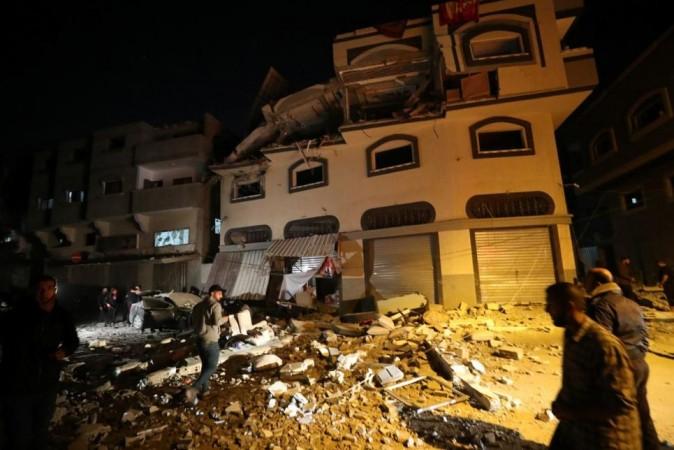The death toll of Palestinians killed in Gaza Strip rose to 16 on Wednesday, November 13 a day after Israeli forces killed Islamic Jihad's commander in a targeted airstrike. The attack led to heavy retaliation including 250 rockets launched by militants targeting Israeli cities, according to reports.
The Islamic Jihad confirmed in a statement that the strike killed Baha Abu Al-Ata, 42, after Israel stated that it launched an airstrike in early hours of Tuesday. The group also said Ata's wife was killed and his children suffered injuries due to the attack on his house.
Describing the attack as a joint operation between the Israeli army and the country's Shin Bet domestic security service, the military's statement said, "A building in the Gaza Strip, in which the Palestinian Islamic Jihad senior leader Baha Abu Al-Ata stayed in, was attacked," AFP reported.

In a separate incident, a targeted missile attack by the Israeli military struck the house of another Islamic Jihad official in Damascus, killing two people including one of his sons. Reports suggest 16 people, majorly militants and some of their kins had been killed in the attacks.
Israeli military spokesman Lt Col Jonathan Conricus called Ata a "ticking bomb" and was behind many cross-border attacks in the country, including the attack targeting a music festival in August and other rocket attacks in November. He was also stated as being behind sniper fire, drone launchings and was planning more attacks.
The statement also alleged he "was promoting preparations to commit immediate terror attacks in various ways towards Israeli civilians and (Israeli) troops during the recent few days," according to the news agency.
Retaliatory missile attacks
Retaliatory attacks from the Gaza Strip against Israel was launched by Islamic Jihad, which triggered sirens from Tel Aviv to as far as about 20 km to the port city Ashdod, witnesses were quoted as saying by Reuters. About 25 Israelis were hurt due to counter missile attacks launched by Gaza.
![Israeli soldiers stand on top of a tank near Gaza [Representational Image] Israeli soldiers stand on top of a tank near Gaza](https://data1.ibtimes.co.in/en/full/558738/israeli-soldiers-stand-top-tank-near-gaza.jpg?h=450&l=50&t=40)
Videos circulating on social media shows missiles being intercepted by the Israeli Iron Dome air defence systems. Schools and establishments across southern and central Israel were ordered to shut down with civilians instructed to stay at home. Public shelters were opened following the attack.
The attack comes days after politician Naftali Bennett, known for his hard stance on Palestinian militants was appointed as Israel's new defence minister. Responding to concerns that the attacks might lead to armed conflict in the conflict region, Israeli Prime Minister Benjamin Netanyahu said, "Israel is not interested in escalation, but we will do everything required to defend ourselves". "This could take time," he added.
Hamas, the Palestinian militant group that administers the Gaza Strip region, said in a statement that Israel "bears full responsibility for all consequences of this escalation" and swore that Ata's death "will not go unpunished".
Consequences of the attacks
The recent attack is likely to trigger armed conflict between the two countries after years of truce. Israel and Gaza militants have fought three wars since Hamas took administrative control in 2007. The armed conflict in 2014 lasting for 50 days is known to be the deadliest.
The slaying of Baha Abu Al-Atta in his Gaza home looked likely to pose a new challenge for Gaza's ruling Hamas faction, which has mostly tried to maintain a truce with Israel since a 2014 war.

















